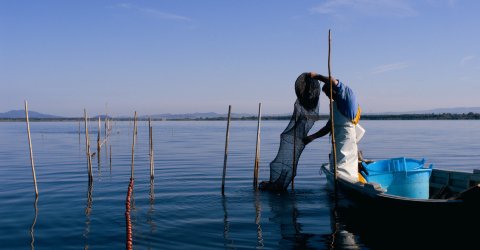
Gastronomic Heritage in Mediterranean Wetlands: healthy wetlands, healthy eating
Wetland products have been staple foods for millennia, but are often either neglected or not well promoted. The new gastronomic e-book Gastronomic Heritage in Mediterranean Wetlands: healthy wetlands, healthy eating, published by the Mediterranean Institute for Nature and Anthropos (Med-INA), not only re-introduces age-old recipes, it also promotes modern and creative ones to inspire interest in the culinary heritage of wetlands, which can become a driving force of eco-tourism initiatives that boost local economies.
The e-book’s objectives are to raise awareness of wetland services and healthy food, to promote culinary cultures based on wetland products as an important source of creativity and strengthening local economies, and to reconnect regions to their wetland heritage.
In the foreword to Gastronomic Heritage in Mediterranean Wetlands, Thymio Papayannis, Ramsar Senior Advisor on Culture and Wetlands, highlights the decisive role that the cultural aspects of wetlands play in strengthening the links of human societies to these invaluable ecosystems, and also brings to the reader’s attention the value of incorporating culture in the integrated management of wetlands.
Today, there is an opportunity to reclaim artisan production and traditional techniques in wetlands. In our modern age, place has become a commodity and food an important part of local economies and tourism. It is hoped that this e-book will not only enter your kitchen, but that it will also act as an inspiration for wetland communities and managers to wisely manage and promote their unique natural and cultural heritage.
This report was made possible thanks to the generous support and participation of the MAVA Foundation, the Mediterranean Institute for Nature and Anthropos (Med-INA), and the Ramsar Culture Network in the context of the project “Conservation of the natural and cultural heritage in wetlands: Global leadership for an integrated approach through the Ramsar Convention”(March 2015-March 2018), and in line with Decision SC53-15 of the Ramsar Standing Committee.
A wide range of contributors provided support and recipes for Gastronomic Heritage in Mediterranean Wetlands, including: Phaedra Andreou, Alexandra Batista, Djordje Belomarković, Nejib Benessaiah, Massimo Bernacchini, Sofi Chapsi, Fabio Cianchi, Tatjana Cirer Kos, Elizabeth Conrad, Matty Cremona, Svetlana Dingarac, Helena Fidélis, Margarita Georgoudi, Filio Karapati, Tomaž Kavčič, Erhan Kurtarir, Zehra Kurtarir, Mauro Lenzi, Aldina Ličina, Josep Maria Mallarach, Ina Nasto, Vasiliki Nitsopoulou, Nikolaos Noulas, Thomae Papadopoulou, Aleka Patsea, Ritsa Patsea, Christian Perennou, Luigi Piro, Koula Prodromidou, Hmayed Sakli, Shalimar Sinno, Theotokis Theodoulou, Maria Tillirou, Sarra Touzi, Yiota Vasileiou, María José Viňals, Mila Vojnović and Lilia Zaouali.